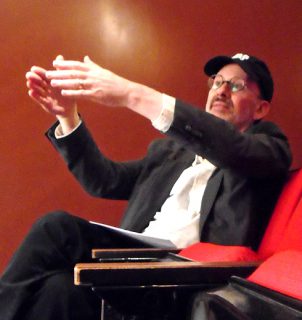NSCAD’s Master of Design program attracts students from around the world.

The summer 2017 term culminated August 8, 2017 with a formal critique of design research projects put forth by 12 students from the Master of Design program, all of who entered NSCAD in May and will complete their degree requirements in April 2018. Some of the students are from countries including India, Bangladesh, and China.
For the critique, each student designed and produced a poster that best delineated for a general audience the essence of their research topic. In brief oral presentations, they explained to the three critics the conceptual framework behind their research and how the posters graphically demonstrated their thesis.
All students presented work that was original in concept and demonstrated their ability to conduct primary research. It is worth noting that many of the students drew from direct experience in selecting their topics, which provided a personal and pragmatic depth to their work. Some of the notable projects include:
Kaitlyn Pilloud investigates how design uses local historical artifacts to combat the problem of drug addiction that plagues small, generally rural communities throughout Canada.
Yuguo Tang explores how through design, she could mitigate the negative health problems experienced throughout China, due to extensive burning of agricultural waste. One of the most severe issues is the poor air quality caused by this problem and the long-term consequences—allergies and respiratory problems—many Chinese endure as a result.
Titu Ayub proposes a critical examination of the fishing industry in the Bay of Bengal to allow local fishermen to adapt to the various environmental changes due to the effects of global climate change. One specific issue is the increasing silt deposits.
Zixi He considers the problem of female Internet celebrities who frequently fall prey to prostitution. She examined how changes to certain social media apps might reduce the risk of these women becoming entrapped in compromising situations.
Jesal Chitalia takes on the large stray dog problem in developing cities such as Mumbai where authorities routinely kill the animals instead of trying to resolve the systemic problems i.e. massive open-air garbage fields, very little or no effort to spay and neuter the dogs, which lead to the over population in the first place.

Critics on the panel included: Associate Professor Michael LeBlanc, Prof. Christopher Kaltenbach, the MDes Summer Coordinator, and Dr. Christopher Mead, Emeritus Regents’ Professor, School of Architecture and Planning, and the College of Fine Arts at the University of New Mexico (U.S.A.).
One of the advantages in asking guest critics—historians, artists, or other practitioners—to participate in these reviews, is the outside voice they bring to the design process and practice. Students benefit immensely from this experience because it expands the conversation and pedagogy they encounter in the studio environment into a broader, often more objective discussion. This initiative also reinforces NSCAD’s focus on research along with its international profile. Prof. Mead’s remarks — “very impressed with the scope of the students’ interdisciplinary concerns” and “the high quality of the presentations, especially from the international students” — clearly demonstrates the benefits of inviting external professionals to take part in these critiques.
Changes to MDes
Next year the MDes program will begin a new chapter in its 10-year history. Beginning in the 2018 fall term, a new two-year degree program will be launched. In addition to the course work, students will undertake degree projects, which are substantial pieces of original practice-led research. The program will remain focused on new knowledge gained through reflective practice, but with more choice to aquire a broader range of skills and knowledge, through more opportunities to persue individual interests.
“This will provide our postgraduate students a much richer design research experience,” says Dr. Rudi Meyer, Director of the MDes Program.
